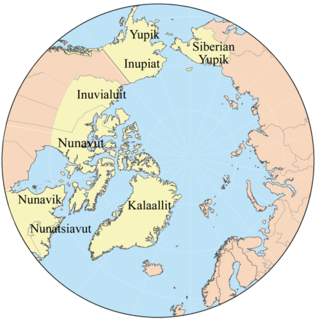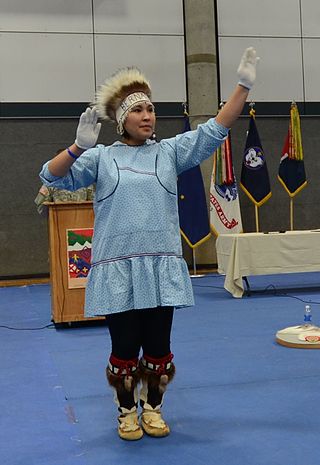
Eskimo is an exonym used to refer to two closely related Indigenous peoples: the Inuit and the Yupik of eastern Siberia and Alaska. A related third group, the Aleut, which inhabit the Aleutian Islands, are generally excluded from the definition of Eskimo. The three groups share a relatively recent common ancestor, and speak related languages belonging to the Eskaleut language family.

The Iñupiat are a group of indigenous Alaskans whose traditional territory roughly spans northeast from Norton Sound on the Bering Sea to the northernmost part of the Canada–United States border. Their current communities include 34 villages across Iñupiat Nunaat, including seven Alaskan villages in the North Slope Borough, affiliated with the Arctic Slope Regional Corporation; eleven villages in Northwest Arctic Borough; and sixteen villages affiliated with the Bering Straits Regional Corporation. They often claim to be the first people of the Kauwerak.

Alaska Natives are the indigenous peoples of Alaska and include Iñupiat, Yupik, Aleut, Eyak, Tlingit, Haida, Tsimshian, and a number of Northern Athabaskan cultures. They are often defined by their language groups. Many Alaska Natives are enrolled in federally recognized Alaska Native tribal entities, who in turn belong to 13 Alaska Native Regional Corporations, who administer land and financial claims.

Gates of the Arctic National Park and Preserve is an American national park that protects portions of the Brooks Range in northern Alaska. The park is the northernmost national park in the United States, situated entirely north of the Arctic Circle. The area of the park and preserve is the second largest in the U.S. at 8,472,506 acres, slightly larger in area than Belgium; the National Park portion is the second largest in the U.S., after the National Park portion of Wrangell–St. Elias National Park and Preserve.
F. Stuart Chapin III is a professor of Ecology at the Department of Biology and Wildlife of the Institute of Arctic Biology, University of Alaska. He was President of the Ecological Society of America (ESA) from August 2010 until 2011.
Traditional ecological knowledge (TEK) describes indigenous and other traditional knowledge of local resources. As a field of study in Northern American anthropology, TEK refers to "a cumulative body of knowledge, belief, and practice, evolving by accumulation of TEK and handed down through generations through traditional songs, stories and beliefs. It is concerned with the relationship of living beings with their traditional groups and with their environment." Indigenous knowledge is not a universal concept among various societies, but is referred to a system of knowledge traditions or practices that are heavily dependent on "place". Such knowledge is used in natural resource management as a substitute for baseline environmental data in cases where there is little recorded scientific data, or may complement Western scientific methods of ecological management.

Katey M. Walter Anthony is an Alaskan aquatic ecologist and biogeochemist researching carbon and nutrient cycling between terrestrial and aquatic systems, and the cryosphere and atmosphere.

Sergey Aphanasievich Zimov is a Russian geophysicist who specialises in arctic and subarctic ecology. He is the Director of Northeast Scientific Station, a senior research fellow of the Pacific Institute for Geography, and one of the founders of Pleistocene Park. He is best known for his work in advocating the theory that human overhunting of large herbivores during the Pleistocene caused Siberia's grassland-steppe ecosystem to disappear and for raising awareness as to the important roles permafrost and thermokarst lakes play in the global carbon cycle.

The Arctic policy of the United States is the foreign policy of the United States in regard to the Arctic region. In addition, the United States' domestic policy toward Alaska is part of its Arctic policy.
Founded in 1980, the Alaska Conservation Foundation (ACF) is a nonprofit organization located in Anchorage, Alaska. Its focus is in finding ways to sustain Alaska's wildlife, coastlines, and mountains from the effects of climate change. ACF's largest contributions come from the funding that they provide for organizations around Alaska that follow a similar pursuit of environmental conservation. As of 2020, it is the only public foundation dedicated to conservation in Alaska. Through the support of individuals and foundations for nearly 40 years, ACF has awarded more than $52 million in grants to over 200 grassroots organizations and individuals working to protect and manage Alaska's natural resources.
The Arctic is a vast polar region comprising the northernmost parts of Canada, Norway, Greenland (Denmark), Sweden, Finland, the United States (Alaska), Iceland and Russia. In recent years, the Arctic has been at the forefront of political and social issues. Several matters have risen surrounding the issues of poverty and global warming and their effects on indigenous people in this region. Indigenous people in the Arctic statistically fall below their nation's poverty line.

Climate change and Indigenous peoples describes how climate change disproportionately impacts Indigenous peoples around the world when compared to non-indigenous peoples. These impacts are particularly felt in relation to health, environments, and communities. Some indigenous scholars of climate change argue that these disproportionately felt impacts are linked to ongoing forms of colonialism. Indigenous peoples found throughout the world have strategies and traditional knowledge to adapt to climate change. These knowledge systems can be beneficial for their own community's adaptation to climate change as expressions of self-determination as well as to non-Indigenous communities.
Susan M. Natali is an American ecologist. She is the Arctic program director and senior scientist at the Woodwell Climate Research Center, where her research focuses on the impact of climate change on terrestrial ecosystems, primarily on Arctic permafrost. She is also the project lead for Permafrost Pathways, a new initiative launched in 2022 with funding from TED's Audacious Project. On Monday, April 11, 2022, Dr. Natali gave a TED Talk introducing the Permafrost Pathways project at the TED2022 conference in Vancouver, BC.
Joanna L. Nelson is an American ecologist and a 2008 Ecological Society of America Sustainability Science award recipient. She is the founder and principal of LandSea Science where she conducts research on coastal communities to find suitable conservation action.
Anne E. Giblin is a marine biologist who researches the cycling of elements nitrogen, sulfur, iron and phosphorus. She is a Senior Scientist and Acting Director of the Ecosystem Center at the Marine Biological Lab.
Michelle Cailin Mack is an ecologist working on the connections between plants and climate in polar regions. She is a fellow of the Ecological Society of America and the American Geophysical Union. She currently holds the title of Regent's Professor at Northern Arizona University.
Vera Kingeekuk Metcalf is educator and advocate known for her work in the preservation of traditions and language of Alaska Native people. in 2019 she was elected to the Alaska Women's Hall of Fame.
Belle Young Gochenauer Deacon was an American basketmaker and language and folklore expert. As an Alaska Native elder, she held and shared knowledge of the language and traditions of the Athabascan people. She received the National Heritage Fellowship in 1992.
Indigenous science is the application and intersection of Indigenous knowledge and science. In ecology this is sometimes termed traditional ecological knowledge. Indigneous science is a holistic understanding of an Indigenous Nations territory or place. It follows the same methods of Western science including : observation, prediction, interpretation, questioning, etc...







